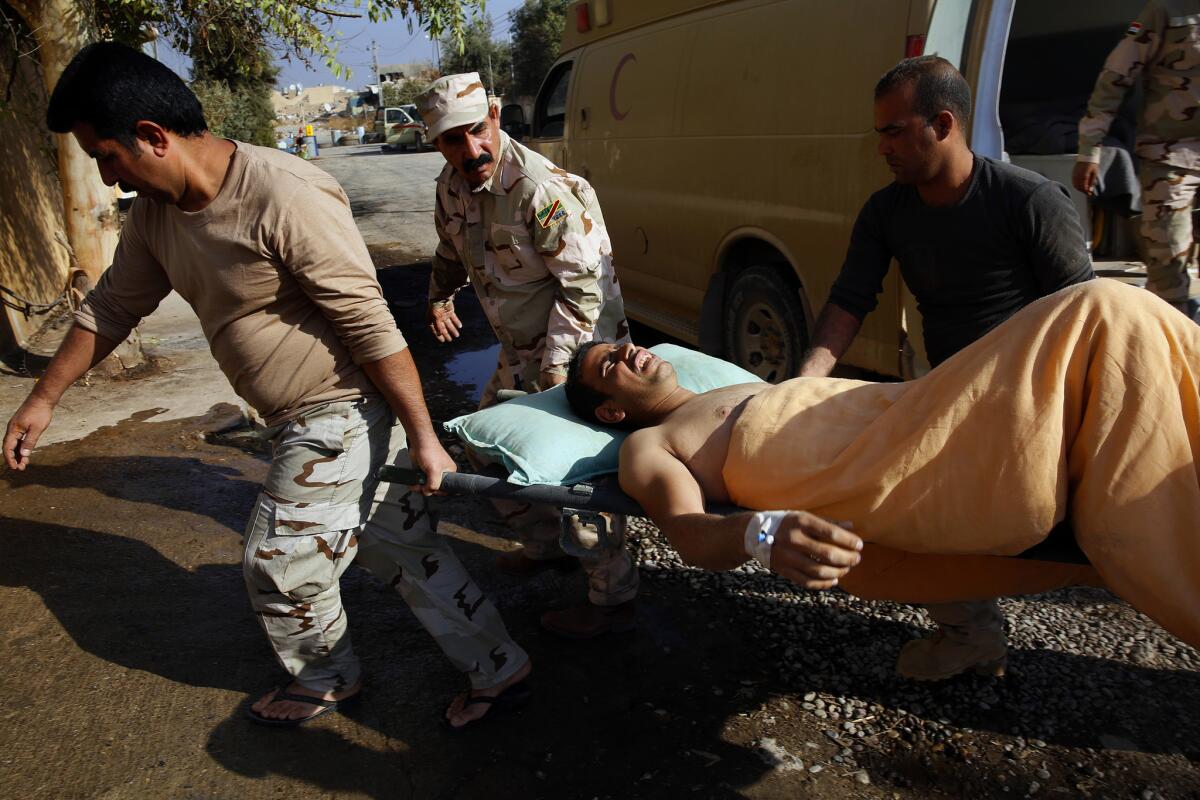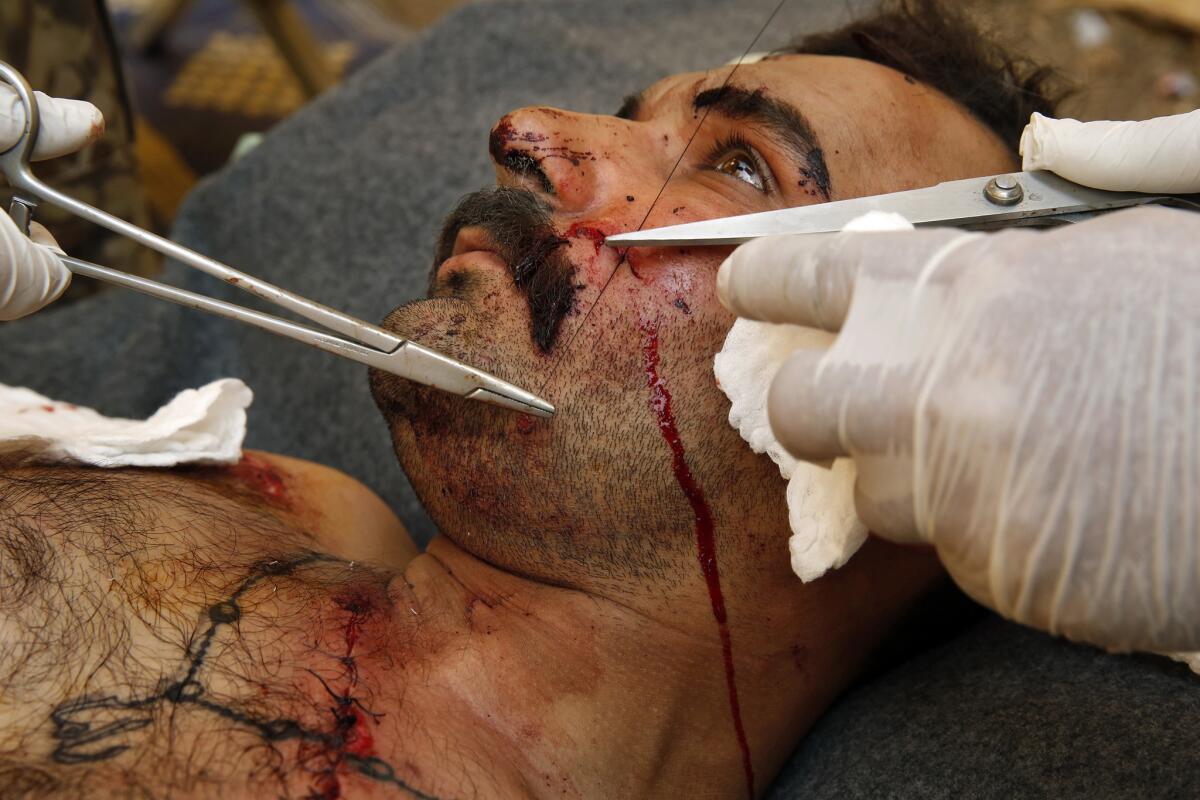Two days, 63 patients, and the constant fear the next arrival may be the enemy
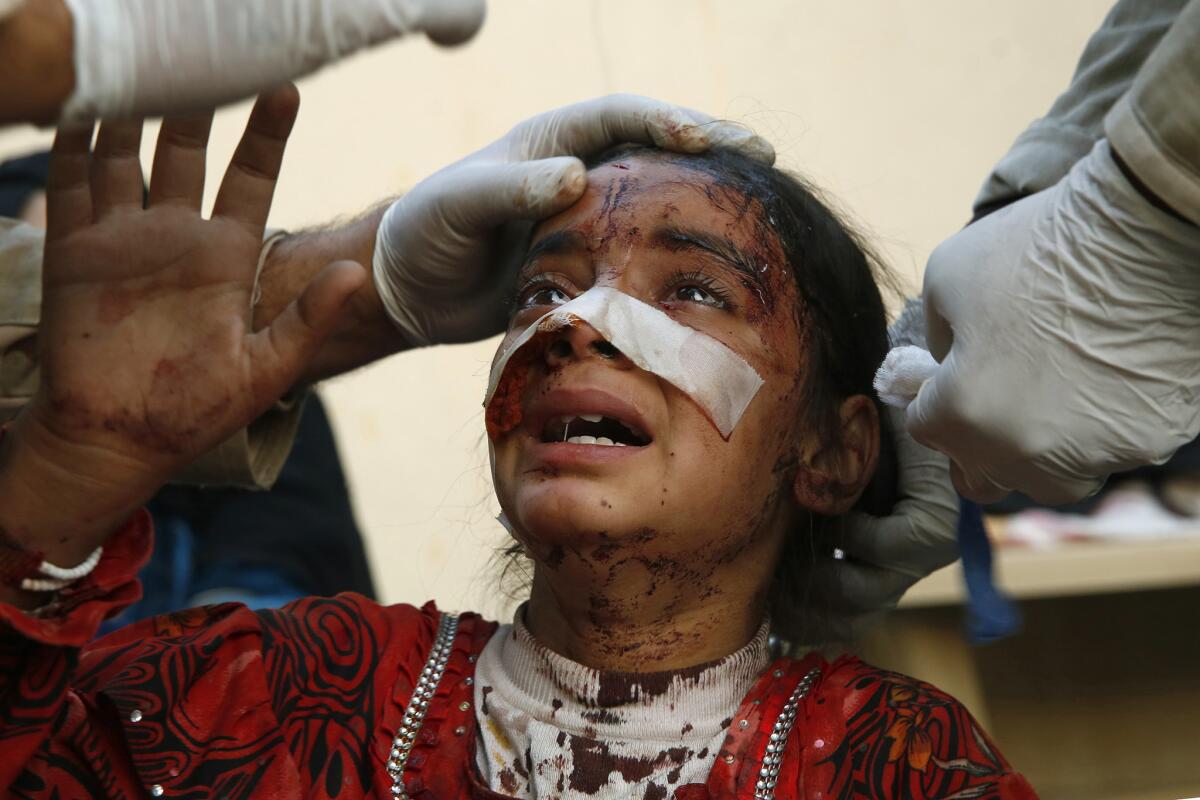
- Share via
Two days, 63 patients, and the constant fear the next arrival may be the enemy
REPORTING FROM KAREMLIS, IRAQ

The teenage girl arrived barefoot at the Iraqi Army field clinic, bleeding from the scalp. In her arms, she cradled a baby with a bandaged head.
Then came her 4-year-old brother, in a blood-soaked Angry Birds sweatshirt. Then an elderly woman vomiting blood in the grass. Then a 5-year-old boy hobbling to a cot on injured legs, shards of glass in his hair, screaming for his dead father.
“It’s the beginning,” said one of the Iraqi doctors, Maj. Gen. Raad Mohssan Dakhel, as he watched families fill the clinic set up in the carport of a house the army had seized from Islamic State. “In coming days, it will be thousands.”
Troops picked up the 21 civilians after a suicide bombing in Mosul’s eastern Intisar neighborhood and dropped them here, about 18 miles east. Doctors had been bracing for this influx of collateral damage ever since Iraqi troops entered the city a week earlier, part of their nearly month-old campaign to take back Iraq’s second-largest city from Islamic State.
Over a period of two days, 63 patients arrived, along with five dead soldiers. The carnage tried the clinic’s five staff members and even the veteran doctors.
There were moments of frustration, anger and doubt. And for the three doctors, a growing awareness that the enemy could be coming in the door on a field stretcher.
The soldier walked in with his cousin’s blood splashed down the leg of his uniform.
Salam Jabar Fayad, 38, said his cousin, a fellow soldier, had been killed in a mortar attack in Intisar while trying to help a family of civilians.
“He was giving food and water to the family. He was trying to save them,” Fayad said.
Fayad’s own right hand was bandaged. When his cellphone rang, he answered using his left, saying only, “He got martyred.”
Capt. Osama Fuad Rauf, who had been busy dealing with the dead man’s body, glanced at Fayad.
“Is he wounded?” the doctor asked, ushering him in for treatment.
Fayad and his cousin had joined the army a decade ago, serving in the same battalion.
“Death split us,” he said as the doctor examined his hand.
Fayad, overcome by emotion, left the clinic and walked a ways down the dirt road, turned his back on the doctors and wept briefly before returning.
Fayad has four other relatives in the Iraqi military. One showed up later, distraught. “Why didn’t you do anything for him?” he wailed.
“It was mortars, what could I do?” Fayad murmured, eyes downcast as clinic staff members led the relative away to see the body in a cooled truck they call “the fridge.”
The day before, a father came looking for his son and found his body in the fridge. The body of a major decapitated by a suicide bomb was kept there too, until it had to be sent home without his head because they couldn’t find it. A soldier refused to leave his dead comrade’s body to be shipped back to Baghdad, and had to be handcuffed.
Later, another soldier would pry his way into the fridge to see a fallen friend.
Fayad would not go to a hospital for treatment. He was bent on revenge. He watched as clinic staff loaded his cousin’s corpse into an ambulance for transport to Irbil.
As doctors and soldiers looked on, Fuad recited the Fatiha, the opening verses of the Koran, over the body:
“Guide us, oh Lord, on the straight path, the path of those upon whom you have bestowed your bounties, not of those inflicted with your wrath."
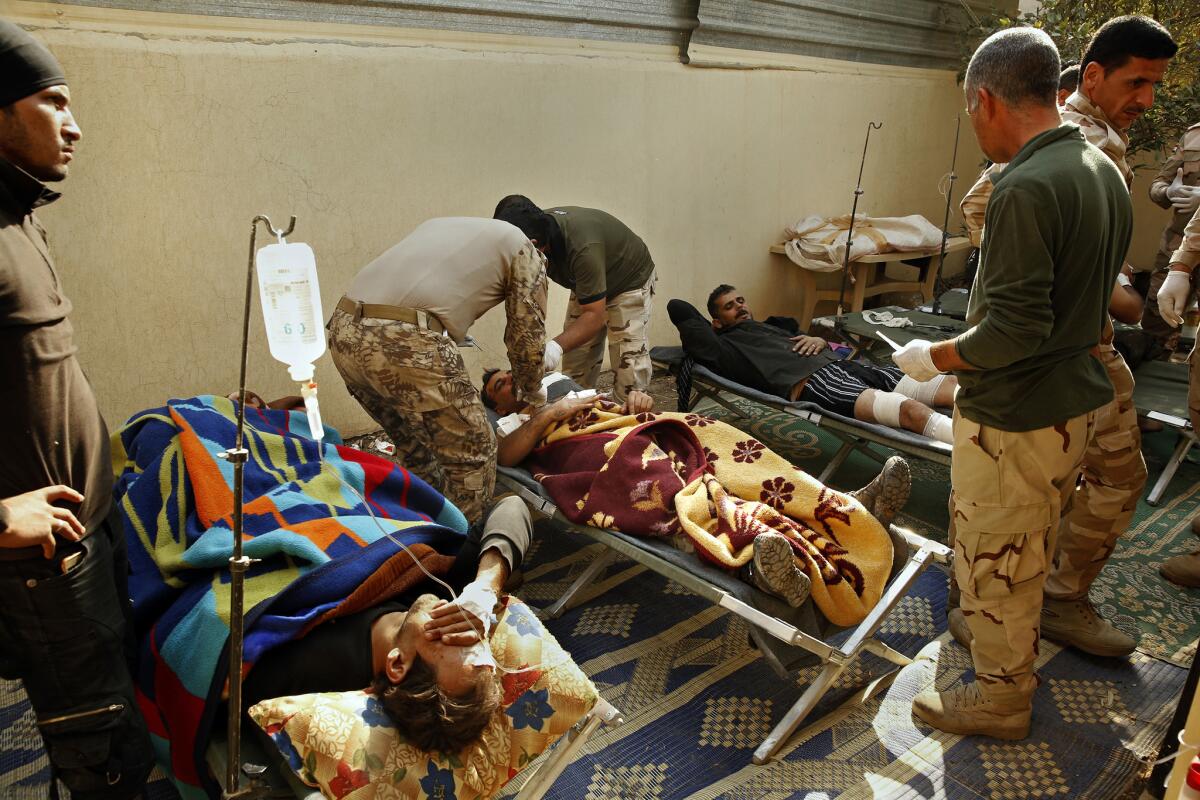
Mohssan, chief surgeon for the Iraqi Army’s 9th Armored Division, has led the medical response to a slew of Islamic State offensives in recent years: Baiji, Fallujah, Qayyarah, Tikrit and Ramadi.
At 52, he has more than 25 years experience at war. He fought Americans as part of Saddam Hussein’s army during the 1991 Gulf War and the 2003 U.S. invasion. Later, he became an ally of the Americans and was trained in Georgia and Louisiana. Friends still send him gifts like his American combat boots and green U.S. 101st Airborne fleece.
He and the other doctors all tuck pistols into their belts. The week before, they had posted extra guards outside and stayed up all night, worried militants would emerge from tunnels in the hills. The doctors know the damage wrought by Islamic State’s heat-guided missiles and chemical weapons, mortars loaded with chlorine.
“You cannot run from the heat missile: We’ve seen a lot torn up from that,” said Fuad, 33, who learned English from watching “Friends” and tries to distract soldiers with jokes.
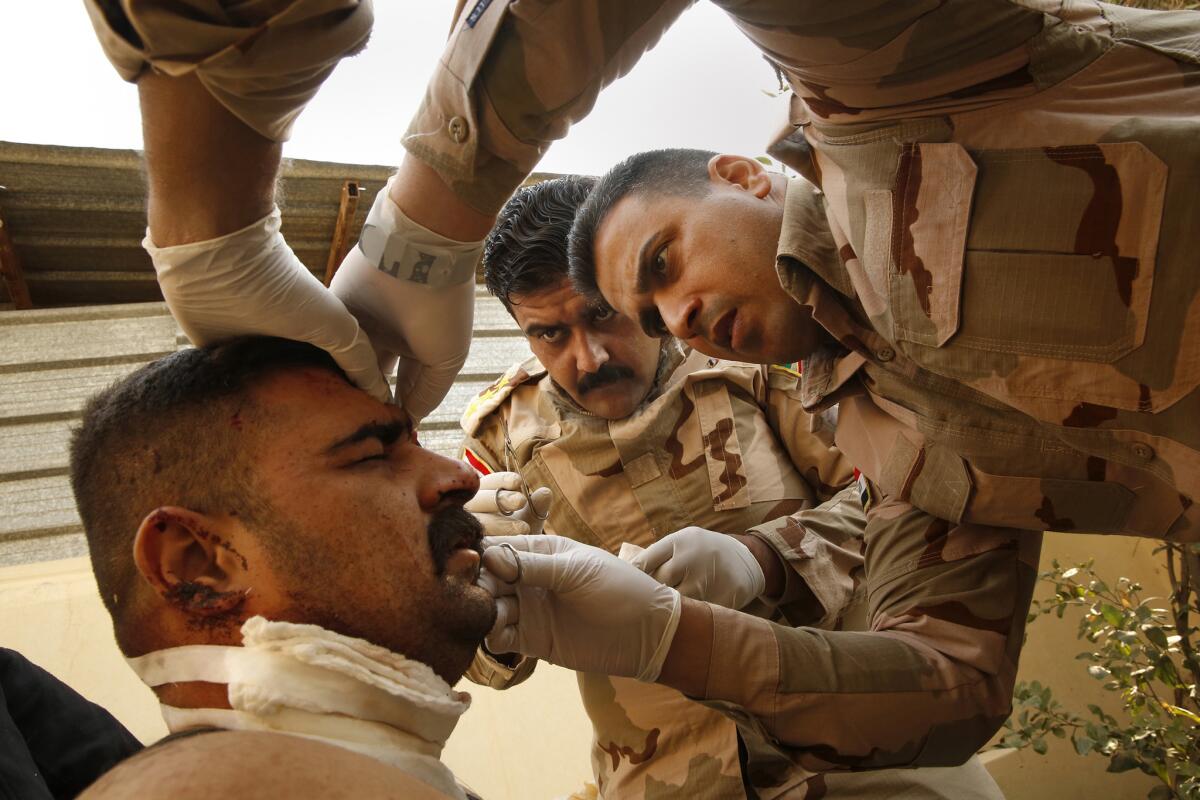
When the doctors arrived at the house that would become their clinic, a Christian church leader’s home that Islamic State had seized to use as a workshop, they found two dead fighters in the garage. About 90% of the homes in Karemlis were booby trapped, littered with mines that army teams were destroying in controlled explosions that echoed through town.
“It’s a gang bang war. It’s not country against country,” Fuad said as he lounged on a blue chair swing outside the clinic, smoking and savoring potent Iraqi coffee before the afternoon rush of wounded.
Moments later, an ambulance zoomed up bearing a soldier bleeding from his arms and chest.
Mahmoud Ismail, 27, a gunner, had been blocks away from his family’s home in Intisar when he was attacked.
He had phoned his daughters, ages 6 and 8, to say, “Baba is coming.”
It’s a gang bang war. It’s not country against country.
— Captain Osama Fuad Rauf
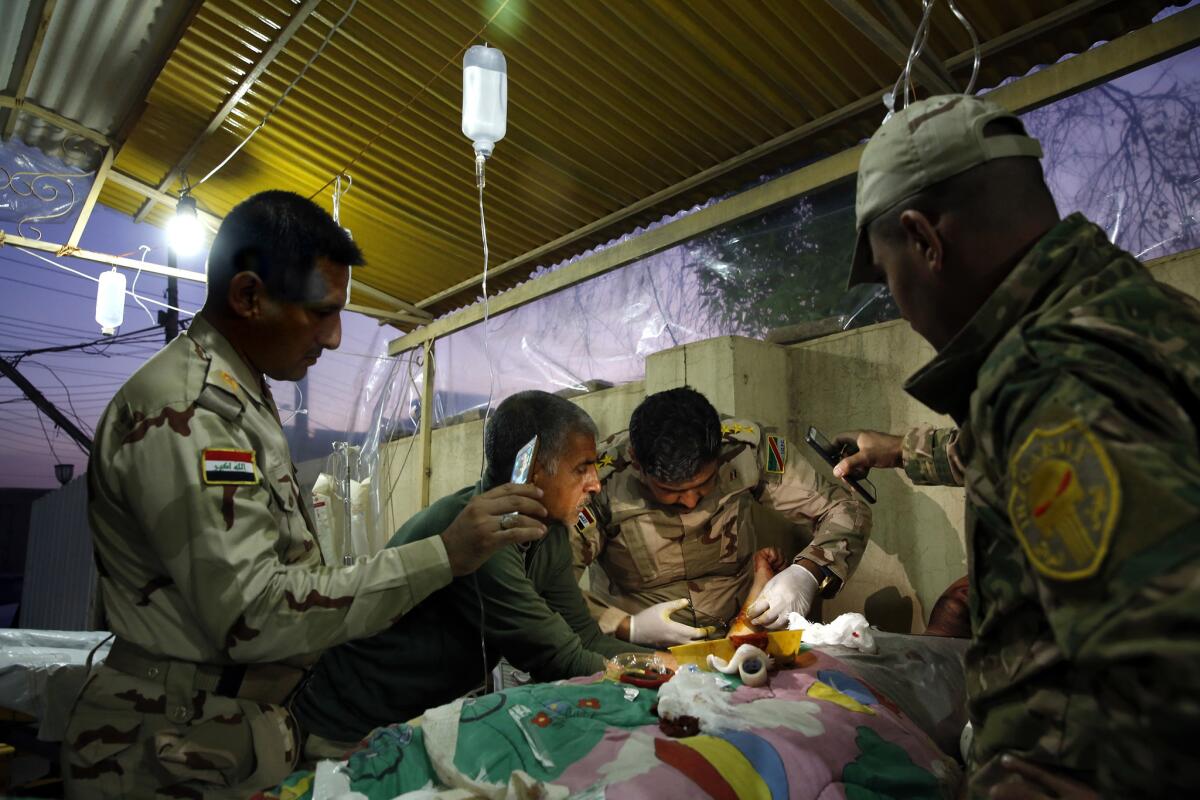
He had not seen his children since Islamic State seized the city two years ago, had never even met the youngest, a boy born after he fled.
As he neared his house, Ismail paused to warn a neighboring family to stay indoors, even though they were excited to see him. “I said, ‘We came to save you, to free you from Islamic State,’ then — mortars,” Ismail said.
Doctors stitched up his right arm by the light of a staffer’s cellphone, waving off flies.
Snipers were responsible for many of the fatalities doctors saw. One of the victims was an Army sniper himself: Hamza Hasan Salman, who arrived too late to be revived.
“I did CPR but…” Fuad muttered, frustrated.
“Same problem: Sniper. Killed directly,” Mohssan said.
“Dirty sniper,” the doctor added, pointing out that the soldier was shot in the groin, a direct hit to the femoral artery.
The doctors say Islamic State marksmen have been aiming for soldiers’ arteries and joints, a tactic that cripples rather than kills instantly, allowing militants to also target soldiers who come to the aid of the wounded.
“He can shoot him in the head,” Mohssan said. “But he will shoot him in a place where three more will come to help.”
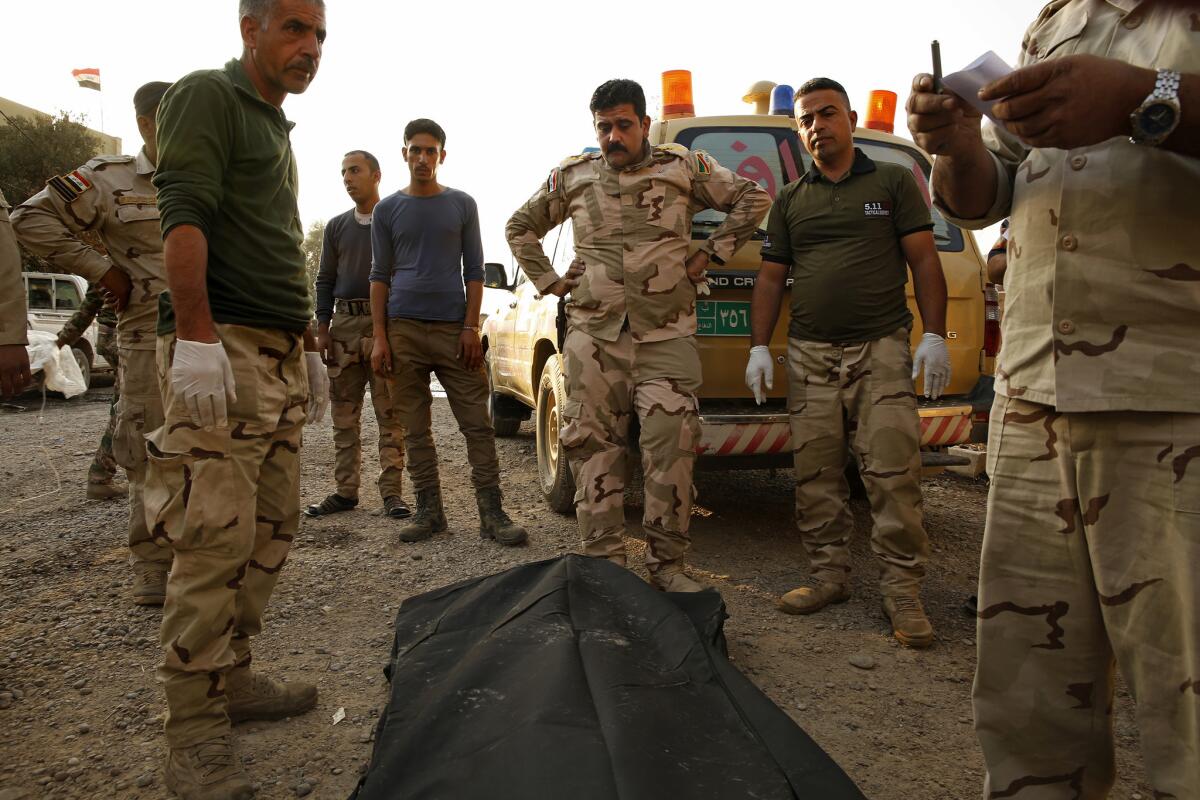
The doctors’ radios buzzed with news that another soldier had been critically injured when a heat-guided missile struck his tank. The clinic was already full of wounded soldiers, wailing and moaning as doctors probed bullet holes and stitched faces torn by shrapnel.
Fuad worried aloud that the latest victim wouldn’t arrive in time.
“Our doctor just called from the front saying they can’t stop the bleeding,” he said.
The patient was two and a half miles from the front line at another abandoned house outfitted as a first aid station in the village of Scheherazade. Mohssan’s clinic was 25 miles further east, across a dirt road bisected by Islamic State trenches and plagued by snipers and mortar attacks. Ambulances were regularly shot at; some broke down. Night had fallen.
“I don’t know if he’s going to make it,” Fuad said.
The soldier ended up in the fridge.
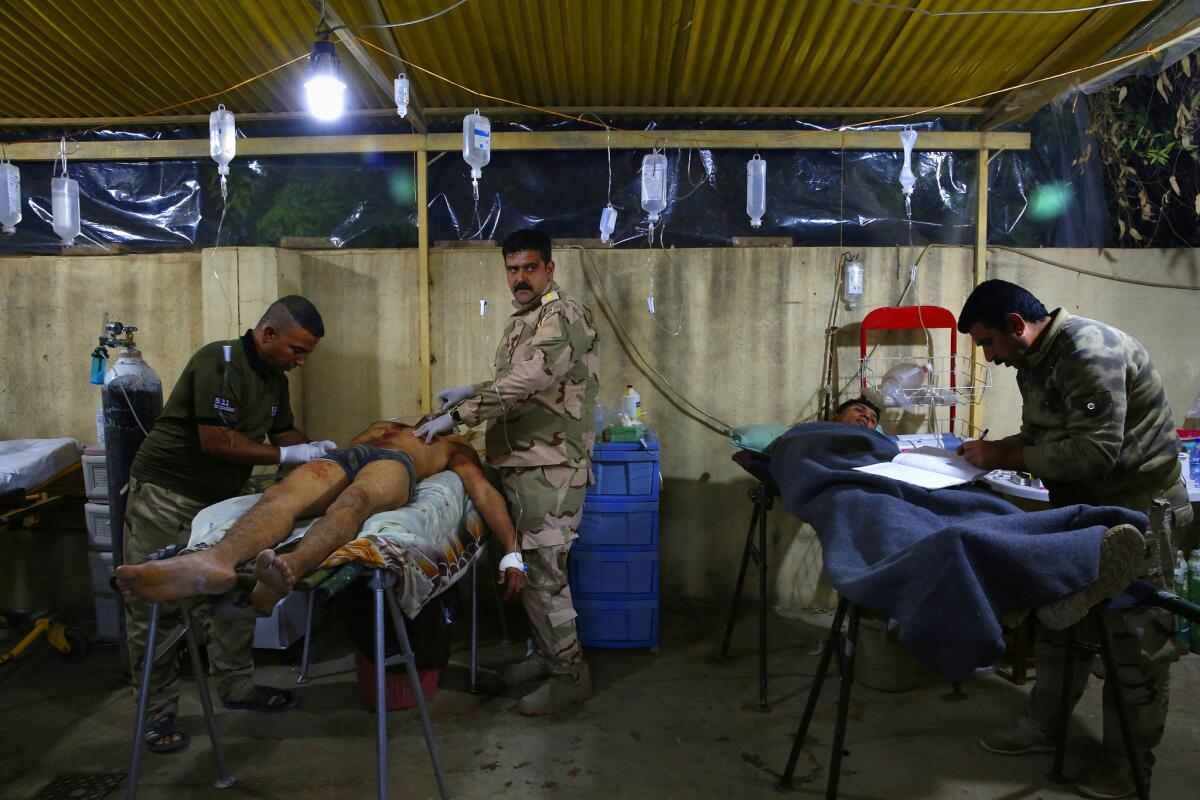
By dinnertime, the doctors were exhausted, looking forward to beans and rice inside the boarded-up house, full of Christian relics they had salvaged including Aramaic books, rosaries and Christmas ornaments.
Then an ambulance pulled in, and Fuad ducked out. “Head injury,” he called from outside.
Mohssan followed, also leaving his food behind.
The soldier was unconscious, pupils dilated, his chest and head . He was young and thin, and blood could be heard gurgling in his lungs.
“Airway?” Mohssan said as his staff moved the soldier to a cot and went to work. “I think I have bleeding. Airway, airway!”
A wounded soldier winced as he watched from an adjacent stretcher. They had been shot with the same bullet. It struck Murtada Abdul Amir, 20, in the left shoulder before felling his friend.
The clinic staff strapped an oxygen mask to the unconscious soldier, 21-year-old Muaz Hameed Hussein, who had been fighting militants at a mosque. His chest continued to rise and fall as Amir watched him silently.
“He’s brain dead,” Fuad sighed, pinching Hussein’s bare leg — no response. Nor would there be.
Monday dawned with more bad news from the front: Another suicide bomb had exploded near a SWAT team in Intisar, killing two.
A survivor arrived wrapped in a flowered blanket with shrapnel in his face and a mangled left hand, moaning and trembling.
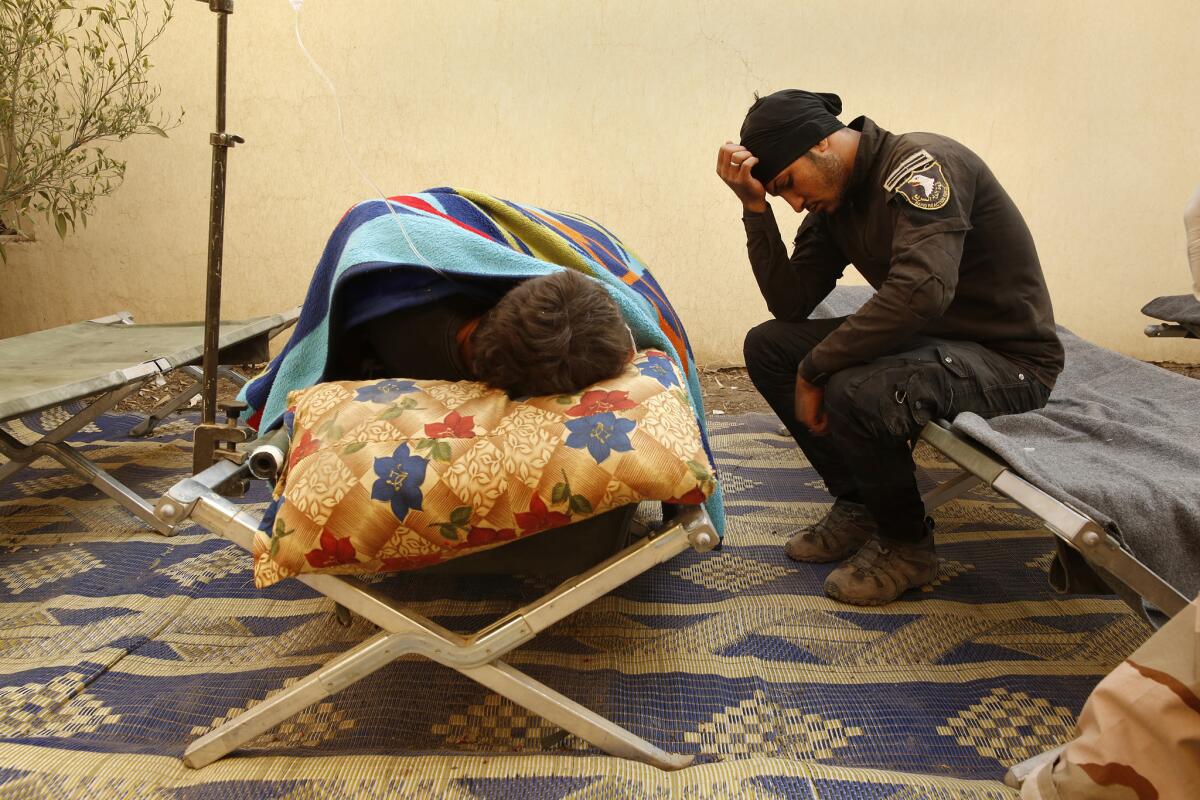
Fuad examined him. The officer had lost a lot of blood and was shaking with fear.
“He’s going to lose his hand. It’s all smashed up,” the doctor said quietly.
Officers who delivered the wounded man said they had tried to shoot the suicide driver, but the car careened into them.
“We’re short on anesthetics,” Fuad said.
They were also short on painkillers. Mohssan planned to go buy some later that day, using his own money and donations from fellow doctors. They didn’t have sterile bedding either. A friend of the general might bring some later. Until then, they would make do with salvaged comforters and pillows.
At mid-afternoon, an ambulance pulled up with the body of a 34-year-old SWAT officer killed in a bombing. Riding shotgun was his older brother, a fellow officer.
Jawad Mustafa, 35, had already lost a brother two years ago during the offensive in Ramadi, in western Iraq. He set his brother’s pack in the clinic driveway. Then he paced, rubbing his brow, as vultures circled overhead.
The doctors were looking forward to a late lunch of tebsi baitinjan, tomato eggplant stew, when civilians injured in a suicide bombing arrived from Intisar, a mad rush of walking wounded.
Almost all of them were shoeless. One woman wore men’s sandals she had grabbed from a neighbor’s house as they fled.
A massive truck bomb had hit two houses where 75 neighbors were sheltering. At least one man, a graduate history student, had been trapped in the smoke and rubble and left for dead, relatives said.
Abdul Jabar, 50, whose children were injured, said their houses had been pummeled with shelling for four days.
“Let Mosul residents get out of Mosul. All of them will die under Daesh,” he cried, using the Arabic acronym for Islamic State.
The doctors moved from patient to patient, wiping blood from victims’ eyes and stitching head wounds. A boy rested on a Disney princess pillow, steeling himself for stitches.
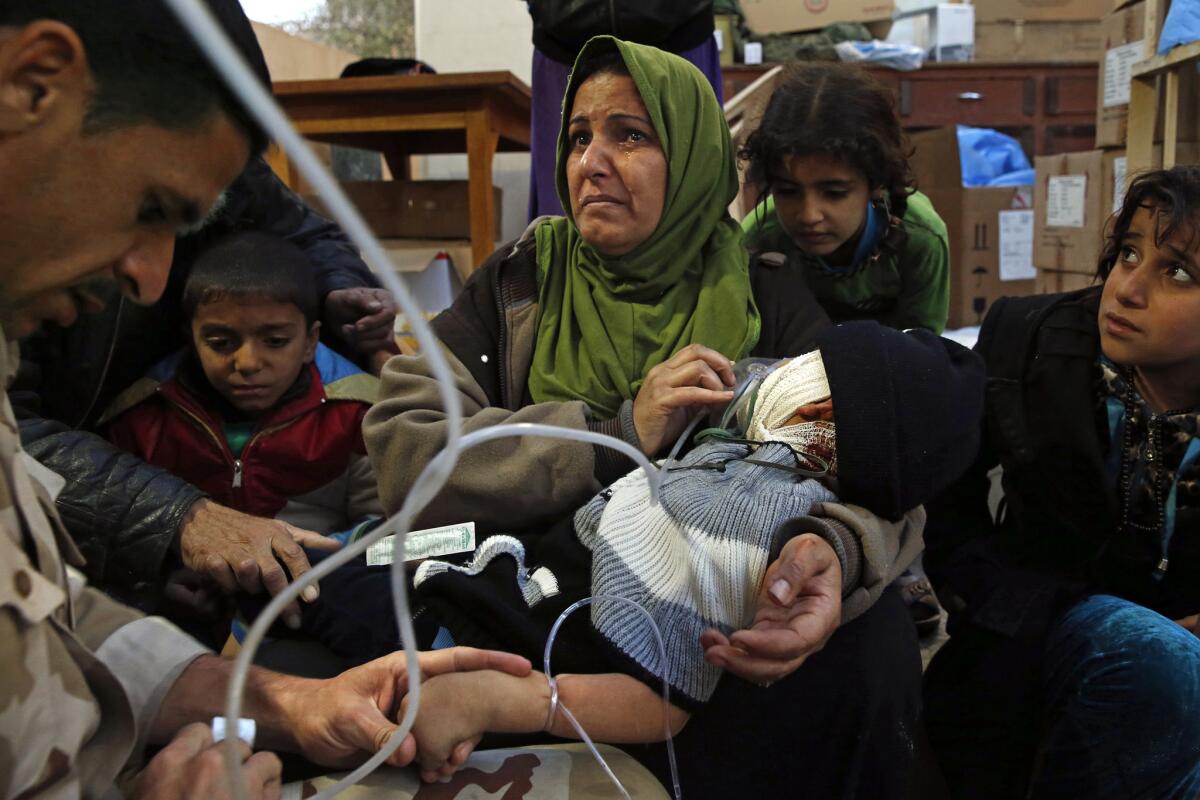
Fuad, who has two young daughters at home in Baghdad, tried to distract 4-year-old Mahmoud Setar by inflating a latex glove for him to play with. The boy just stared, silent and still.
Next to them, Mahmoud’s 17-year-old sister Doha Abdul Setar was scowling, adjusting her gold earrings and checking her headscarf after one of the doctors, Maj. Mohammed Hassan Abdullah, stitched her scalp. She seemed to blame the violence on the Iraqi army.
“If you guys didn’t show up, this never would have happened,” she told the doctor as she pulled close her 5-month-old son Marwan, his head wounded by debris, and prepared to nurse him.
Doha’s mother warned her not to talk about Islamic State.
Hassan asked where the teenager’s husband was.
“Still in Mosul. He was in the police,” she said.
The doctor thought she was lying. Was her husband a militant? he wondered.
Then her 4-year-old brother fainted, and Hassan turned to help.
Medics held an oxygen mask to the boy’s face and tried to find a vein for an IV. He lay motionless in his mother’s arms at first, then started wailing weakly and bucking his legs.
“Good sign,” Mohssan said.
Other children were crying.
“It hurts, it hurts! I swear I’m dying!” screamed Menar Hassan, an 8-year-old girl in a red dress whose father had died in the bombing. She gripped her uncle’s hand as Fuad stitched her cheek.
Mohssan surveyed the cots full of bloodied, broken bodies, then turned to a bearded 20-year-old man in an aqua sweatshirt.
“Why didn’t one of you just kill them? If each one of you had a knife and killed one Daesh fighter, this would be over,” the surgeon said.
The man looked at him blankly. “We didn’t have any weapons,” he said.
The general was suspicious. Almost all of the civilians claimed to have relatives who were police. Yet they had not resisted. In a besieged city, where were they getting food and education, if not from Islamic State?
Only later, after Hassan had finished treating the injured and accompanied them by ambulance to a displaced persons camp, would he be sure.
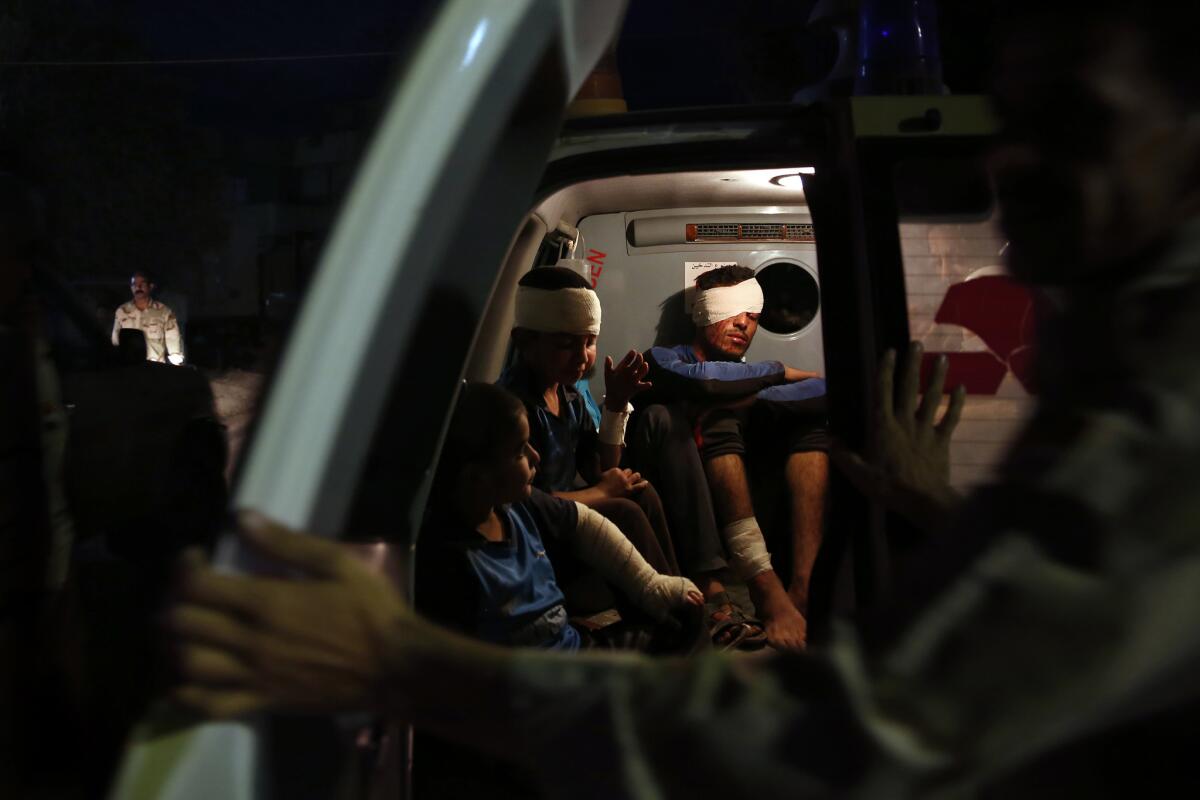
As they stopped at a checkpoint, the men in the civilian party attempted to flee. The doctor and a clinic guard whipped out their pistols, handcuffed the men and turned them over to camp security.
The security officers recognized three of the men as Islamic State supporters from a village outside Mosul. The families hadn’t been residents of Intisar at all; they had come in before the army arrived.
The officers checked a government list of ISIS militants. The men’s names matched. They were detained, while the rest of the family members were taken to the camp and a hospital in nearby Irbil. Hassan warned hospital staff to ensure they didn’t escape. He called the next morning to double-check.
Fuad was shaken. He was haunted by the memory of the scowling teenage girl.
“We treated ISIS without us knowing,” he said.
Twitter: @mollyhf
Produced by Sean Greene
Sign up for Essential California
The most important California stories and recommendations in your inbox every morning.
You may occasionally receive promotional content from the Los Angeles Times.
